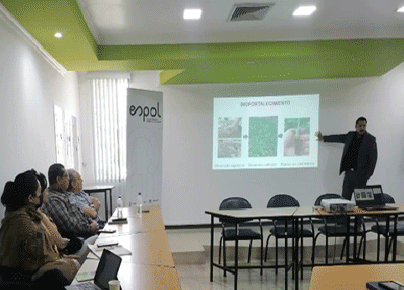Ecuador Takes Steps to Prevent TR4 Incursion
2023-01-27

In 2022, Ecuador completed another year without Fusarium Race 4 (FocTR4) in its territory. The plague was detected in 2019 in Colombia (in the Guajira sector), in April 2021 in Peru (Piura) and Venezuela confirmed the presence of the fungus on January 19. The plague has not entered Ecuadorian territories yet, and from the public and private sectors, new initiatives are planned for this year so that it continues like this.
The Ecuadorian Center for Biotechnological Research (CIBE - Espol), which celebrated its twentieth anniversary on January 27, presented three projects.
One is the institutional program against Fusarium TR4, in which prestigious international universities collaborated.
The program has six financed projects to develop resistance in the banana varieties produced in Ecuador and generate friendly alternatives to combat the disease. The institution advanced other details of the program. "CIBE together with the Ministry of Agriculture and Livestock (MAG), through the Undersecretary of Musáceas and the National Institute of Agricultural Research (Iniap), we have advanced in our collaboration with the best international universities to combat the threat of FocTR4 on bananas".
Raúl Jaramillo, executive director (e) of Iniap, pointed out that "Ecuador will have banana plants that are tolerant to FocTR4 and other diseases that threaten crops. The Iniap and the Cibe collaborate in the investigation to obtain materials that ensure a healthy and profitable agricultural production". For this year, the Ministry of Agriculture and Livestock (MAG) and the Phytosanitary and Zoosanitary Regulation and Control Agency (Agrocalidad) plan to import more pest-tolerant varieties, Minister Bernardo Manzano revealed to the local press. In April 2022, the Government imported 4,620 in vitro Formosana GCTCV-218 banana plants from South Africa, which are still observed in the Iniap laboratories. In addition, in 2022, the Government announced a budget of $8 million to prevent the entry of the fungus. Manzano assures that this year the budget will be similar.
Agrocalidad's balance sheet on the actions implemented last year that kept the plague out of the country shows that 3 million shoe disinfections were carried out in ports, international airports, and border crossings. About 455,068 light and heavy vehicles were disinfected at border crossings and barrier and control blocks; 696,723 containers in ports and 585 used agricultural machinery were disinfection. In addition to monitoring Musaceae production sites nationwide, benefiting 15,000 producers and guaranteeing 365,000 hectares of crops, according to Agrocalidad.
The II National Action Simulation to deal with possible Fusarium outbreaks, which took place at the Porvenir Hacienda, located on Via Buena Fe, is another action carried out this year to prevent the arrival of the plague in the Quevedo canton.
This farm has 380 hectares in banana production, of which 365 hectares have implemented the biosecurity measures that the Agency establishes to reduce the risk of the disease from entering the country, establishment, and spread of the Foc TR4.
One hundred thirty people participated in the simulation, including producers, exporters, academia, research centres, and teams from the Agency, IICA (Inter-American Institute for Cooperation on Agriculture), and GIZ (German Society for International Cooperation, in German). The first field drill carried out by Agrocalidad took place in 2019 in the province of Bolívar.
Meanwhile, the participants worked under the four-stages methodology:
· Biosecurity measures in production sites;
· Symptoms and routes of dispersal;
· Phytosanitary surveillance for Foc TR4 and Sampling; and
· Eradication.
In each part, themes of the plan that contemplates suppression, containment, and eradication actions were addressed, based on which training, dissemination, workshops, and standardization of laboratory detection methodologies, among others, have been carried out as the establishment of phytosanitary regulations.









